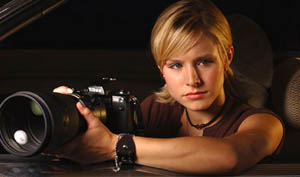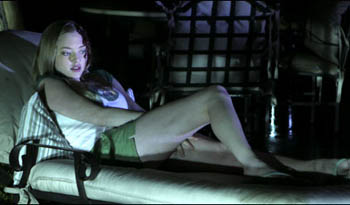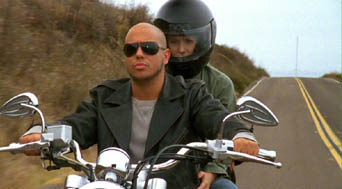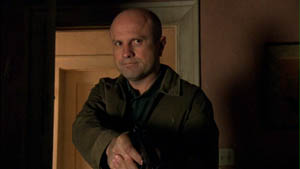|
It's entirely possible that Veronica Mars is, in fact, smarter than you. Sure, she may only be sixteen, but the words and actions she gives life to were all created by much older people, after all. Those people are quite possibly at least more clever than you. They're definitely more clever than most people who write for television. Thankfully. 
I could tentatively blame this fact for the reason why this series, which has now run its course with three seasons, failed to ever land a large or even moderately-sized audience. It features a cast of mostly teenaged characters, and as such was aimed largely at a teenaged audience, many of whom were likely too stupid to actually follow what was going on in this show with any great measure of success. This is not to inadvertantly paint myself into the position of declaring that those who did watch and love the show were uniformally smart; as with any fan base, it's a mixed bag, and can boast of a great many idiots, if such a thing can truly be deemed boastworthy. I came to view this program because of tentative comparisons which had been made with Twin Peaks, though the similarities were at best superficial: a popular, blond and borderline delinquent young girl is murdered, and the quest to find her killer drives the series forward. Unlike the legendary murder of Peaks' Laura Palmer, however, the death of Lilly Kane is considered a closed case, now only of continued interest to former sheriff Keith Mars, who lost his job after accusing Lily's powerful father, and Keith's daughter Veronica, Lilly's best friend and the only one still standing behind her father's convictions that the wrong man was arrested for the crime. I'll admit that the first couple of episodes didn't suck me in with undue rapidity. The first episode, while decent enough, ends up a little too James Bond-gadgety, and the second one guest-starred Paris Hilton as the world's oldest teenager and the series' worst and least convincing "actress" in its entire three years; I've no idea why that vapid walking stick ever ended up being popular amongst any group with an average IQ above that of your typical goat, but her presence in something I'd paid money for did nothing to ingratiate me. The third episode's resolution felt a bit soap-opera cheesy, and I was starting to wonder if perhaps I'd made a gross mistake. But things began to pick up, and when I reached episode five I found that the show had done something smart and unexpected, and I felt very surprised and pleased (and frankly, relieved; spotting a good sale on the boxed set, I'd bought it sight unseen, which I almost never do). Quality remained high from that point forward, and by the final episode of season one I was only too happy to shell out for season two.  Veronica is what one would expect to get from casting Veronica Lake in the role traditionally occupied by Humphrey Bogart: an attractive, cynical blond who's been wronged by the world and posesses a knack for digging through the unseemly affairs of others. While the network wanted-and got-a bright, sunny teen-show look, the plot structures and main character voice-overs were straight out the noir style, even if the setting often seemed to obscure the show's seedier origins. As we meet Veronica, she's still mourning the loss of her best friend, she's lost the remainder of her friends after her father's fall from grace dragged her down with him, and worst of all, she's privately dealing with the fact that she was drugged and sexually assaulted at a party, only for the asshole sheriff, a former deputy under her father, to blow off her report as a case of crying wolf. Unwilling to believe that this smug jackass succeeded where her father failed, she begins digging for clues to suggest that Lilly's confessed killer was a patsy for the real perpatrator. I should say straight off that regardless of whatever else might be in the offing, the series wouldn't work if Veronica herself didn't work, as there's scarcely a scene that she doesn't appear in, especially in the first season. Series star Kristen Bell fortunately rises to the challenge-I have no idea of her own intelligence level, but she successfully plays Veronica as smart and resourceful beyond her years, as well as nosy, pushy and manipulative, lest we find her too idealized. Her search to find her best friend's killer is an all-consuming one, a goal which must be acheived regardless of who else need be stepped on, used, or disregarded along the way. Amongst the supporting players in her orbit are Duncan Kane, Lilly's brother and Veronica's ex, Lilly's own ex Logan Echolls, the spoiled son of a movie star and possessor of just a few personal issues, Wallace Fennel, new kid in town who initially runs afoul of the notorious PCH biker gang, and Eli "Weevil" Navarro, the leader of said gang and best described as a reminder that a thug with a heart is still a thug. And of course, there's Lilly herself, whom we meet in flashbacks, whose portrayal is an interesting choice. Played by Amanda Seyfried and being one of those sorts of girls who seems genetically desiged to provoke inappropriate thoughts in much older guys, she's The first season plays out satisfyingly enough, the resolution to Lilly's murder not being inordinately complex but sufficient to hold our interest when mixed in with all of the shorter arcs and one-off mysteries filling out the runtime. (Series creator Rob Thomas has claimed that he learned from Twin Peaks the necessity of actually solving the crime, an interesting lesson to take away, since the revelation of Laura Palmer's killer was the very thing that killed Peaks' ratings.) Even in reference to its beginning stages, the one word that best sums up Veronica Mars' skill with storytelling is economy. More happens in an episode of this show than four of your average hour-long drama series; there's usually an "A" and a "B" story running in a given episode, with details from previous or upcoming plot threads and discoveries concerning the season-long arc weaving through amidst it all. Hand-in-hand with this aspect is the fact of the show's disinterest in pandering to the knuckleheads; if you didn't notice a clue the first time around, the episode isn't going to squander its time reiterating or over-explaining things for you. In short, if you aren't as smart as Veronica, you're likely to get left behind, where you belong. 
Never is this more true than in the series' second season, which is as twisty-turny as The Big Sleep on a regular basis. Also like The Big Sleep, with its famously unresolved chauffer death, Veronica Mars' second season also has so damned many plates in the air that a few of them eventually get tossed right out of the window and forgotten about. The temporary absence of Veroinca's pal Wallace seems particularly suspect; his departure is set up better than his return, and the whole affair feels very utilitarian, as if the actor needed to be absent for a stretch and was accomodated as best as could be done on short notice. His mother and father, both important and recurring characters at the start of the year, all but vanish completely by the halfway point. But in most ways, this year shines as the best of the three, with its primary case involving a busload of students going tragically, if not accidentally, into the sea, and its secondary thread of Logan Echolls' framed-up murder case set against an expanding cast of characters. Either by choice or by inevitability, season two is largely a story of parentless children, as Duncan Kane, Logan Echolls, and the Casablancas brothers are all, for varying reasons, left to fend for themselves, and if money is no obstacle, the same cannot be said of the emotional consequences. Only Veronica herself maintains an enviably healthy relationship with a parent, and even that relationship will be sorely tested before the season comes to a close. Jason Dohring's charismatic portrayal of Logan (shades of a young Edward Norton) cements him as the series' male lead, bringing nuance to a character that a lesser actor could easily have reduced to cliché. By the finale, which effectively entwines and ties up more plot threads (some going back to the pilot episode) than some series manage in their entire runs, one is left wondering why the show didn't get rewarded with a huge audience share and big pile of "Thank you for making TV that doesn't suck" awards. 
What it did get was its third season on then-new network CW, which was unfortunately the weakest of Veronica's three years, although one which began well. Initially focusing on a serial rapist at Veronica's fictional Hearst college (Patty Hearst herself would play a small part during this arc), the plan was for season three to feature three mini-arcs rather than one season-long arc, as the producers felt, possibly with some justification, that year-long, mind-contorting plots intimidated the crap out of new viewers, which the show needed to attract in order to justify renewal. The nine-episode "Hearst rapist" plot is the season's best offering; things get somewhat rockier from there on. The second arc, involving the murder of a college official, gets rather tripped up by the inclusion of a nested two-part story, also involving a murder investigation, that interrupts it mid-stride; obviously going for stories with strong dramatic appeal, the placement of two equally serious cases in the same plot arc is too much at once, and throws things out of balance. The structural problems with season two could largely be ignored in light of its impressive plot convolutions. Season three's structural problems are greater, and it generally impresses less (the atypically sublime resolution to the second arc being a noteworthy exception). Dick Casablancas begins the year having a terrible attack of self-reflection following the events of season two, only for this thread to disappear again until the final three episodes. Veronica's love life also vacillates between hot and cold so many times during the year that I lost track, and both Wallace and Weevil frequently got lost in the mix. But the main problem with the year lies in the season's third arc, by virtue of the fact that there isn't one. Prior to the final five episodes, the higher-ups decided to finish out the year with a handful of self-contained episodes, with the time Despite its last-act stumble, Veronica Mars still deserves credit for trying and largely succeeding in bringing some intelligent stories and characterization to a medium in such need of it. Since its unfortunately unsurprising cancellation, suggestions have floated about the grapevine concerning a Veronica Mars feature film that could possibly bring closure to the cliffhanger-ending series (much as was done with the Firefly sequel Serenity, which frankly posed far more challenges than a Veronica feature ever would). This finally saw fruition via a record-breaking Kickstarter campaign that at last set the wheels in motion in the spring of 2013. Little is known as of yet just what the film will entail, and despite its great economy of writing, it remains to be seen whether one of the most plot-intensive series ever can properly be capped off in a two-hour feature. But even if it doesn't provide the best of all possible endings (crossing my fingers and hoping for no fan-pandering, inappropriately happy wrap-ups), we're still left with three years' worth of pretty damn good TV, and that's no small feat. -review by Matt Murray
|
|
||||||||